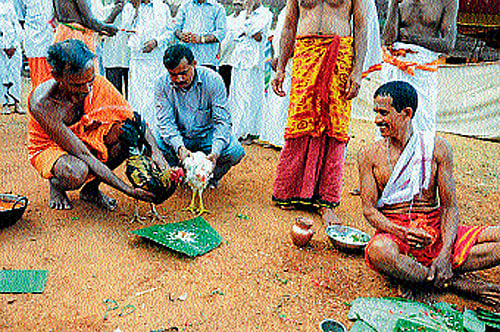
It’s literally like a seesaw situation for the 3.5 lakh odd Marati community in South Canara, pertaining to their community reservation status in Karnataka and Kerala.
The community is mentioned in the Scheduled Tribe (ST) list in Karnataka and in Kerala they come under Other Eligibility Community (OEC), devoid of all the benefits of ST status but availing educational scholarship. It was in 2002, the Kerala government excluded the community from the ST list.
After a long 11 year struggle, Maratis of Kasargod under the aegis of Kerala Marati Samrakshana Samithi (KMSS) won the battle of re-inducting the community in ST list in Kerala. But curious enough, though the President of India had ratified the Parliament amendment for the re-induction of Maratis, Kerala has recently sent a dissenting note to the Union Ministry of Tribal affairs.
History
The roots of Maratis can be traced in Maharashtra around 700 years ago. It is said that the Marati people began migrating to the south after the unbearable famine and outbreak of epidemics since the death of erstwhile Marata Emperor Chathrapathi Shivaji.
A majority of them settled in undivided South Canara comprising Dakshina Kannada, Udupi and Kasargod. After independence, the community was accorded ST status in Karnataka. The Maratis enjoyed the reserved quota after 1956 also, when the state of Kerala was formed and Kasargod became a part of it. But in 2002, Kerala government agency, KIRTADS (Kerala institute for research training and development studies of scheduled castes and tribe) submitted a report to the government recommending exclusion of the community from ST suggesting that Maratis no longer suffer from primitiveness and isolation, the two distinct criteria to decide upon the status.
Approving KIRTADS report, Maratis of Kerala were stripped of their ST tag and was put under OEC, which enabled them only to get educational scholarship up to SSLC.
According to the President of KMSS, Shyam Prasad Naika, currently there are 3,42,000 Marati community people residing in Dakshina Kannda, Udupi, Kodagu and Kasargod districts. Kasargod is the only district in Kerala having Maratis with 42,000 odd community members.
Re-induction
After more than a decade of mounting pressure, the community succeeded to regain the lost privilege and the present Kerala government had sent a report favouring the re-induction of Maratis into ST.
The bill, Scheduled Caste and Scheduled Tribe Orders (amendment) Act 2013, was passed on September 8, 2013 in the Parliament. The same was ratified by the President of India and the copy was sent to the Chief Secretary of Kerala. But instead of publishing the information in state gazette, on November 16, 2013, the Principal secretary to the Kerala government has sent a disapproving note to the Centre. A copy of the report which is with Deccan Herald says that state government has received a series of petitions questioning the rationale of re-conferring ST status to Maratis. It also invokes the stand of KIRTADS in the matter since 1981.
Simmering resent
The organisations representing other ST communities in Kasargod viz Koragas, Malavettuva, Mavila and Jogi are up in arm against the re-induction of Maratis into ST category. Their contention is that Maratis living condition is far better than any other ST communities and to substantiate that they point to the sizable number of Marati people serving as doctors, engineers, banking professionals and police personnel.
More importantly, they point to the fact that if ST status is re-accorded, all reservation benefits will be amassed by Marati community as the community members are more educated. The book, ‘Kasargod: History and society’ published by Kasargod district panchayat in 2001 says Maratis of Kasargod are a better lot than other ST tribe.
“In terms of food, hygiene and social awareness Maratis are on par with non-reserved communities and they are far ahead than Koraga and Malekudiya considering their improvement in social, economic, health, educational spheres,” the book reveals.
It also notes that Marati people are capitalising almost all the ST benefits in the district. According to 1981 census, 55.9 per cent Maratis constitute the total ST in Kasargod. Their literacy rate is 38.2 per cent as per 1991 census.
‘Will move court’
As Kerala government is reluctant to issue a gazette notification of the Parliament approved re-induction of ST status to Marathi community, KMMS has decided to move court.
“Any state government is bound to follow a bill which has been approved by Parliament. The Kerala Chief Minister has told us that some 6 MLAs belonging to OBC and various OBC organisations are pulling back the government from issuing notification. Hence, we are going to court,” KMSS President told Deccan Herald.
